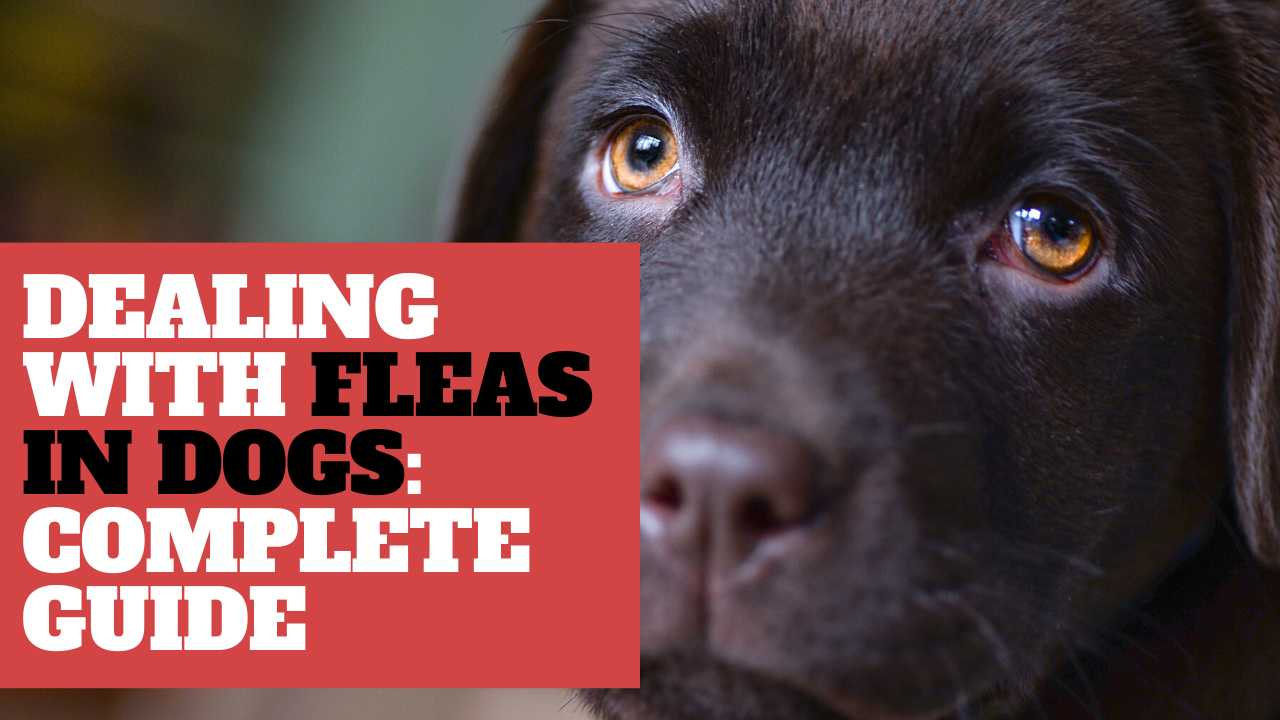This article will answer all your doubts and questions about fleas in dogs so that you have to look no further.
Dogs are a bundle of joy, offering us companionship and unconditional love. But along with all the love, they can also bring some unwelcome hitchhikers – fleas. Fleas are a common concern for dog owners, as they can cause a lot of discomfort for both our furry friends and us. In this article, we’ll dive into some of the most commonly asked questions about dogs and fleas, helping you grasp the issue better and giving you practical tips to keep your pet flea-free.
What Exactly Are Fleas?
Fleas are tiny, wingless critters that thrive on the blood of mammals, including our beloved dogs and cats. They’re small, reddish-brown, and incredibly nimble, which makes them quite the elusive target when hiding in your dog’s fur. These little jumpers can leap impressive distances, enabling them to hop from one host to another in no time.
How Do Dogs End Up with Fleas?
Dogs can pick up fleas from various sources, and some common ways include:
a. Hanging out with other infested animals, be it dogs, cats, or wildlife.
b. Frolicking or strolling in areas where fleas lurk, like tall grass or wooded areas.
c. Coming into contact with bedding or furniture that’s been infested with flea eggs or larvae.
d. Even interacting with humans who might unknowingly carry fleas on their clothing or belongings.
What Are the Telltale Signs of Fleas on Dogs?
Spotting fleas on your dog can be quite a challenge, given their tiny size and speed. Look out for these signs:
a. Your dog relentlessly scratching, biting, or licking themselves, particularly around the tail, neck, or back.
b. Skin that appears red, irritated, or sporting hot spots and rashes.
c. Small, dark specks on your dog’s fur, resembling grains of sand – that’s actually flea dirt, which is flea excrement.
d. If you can spot the actual fleas or their bites on your dog’s skin, you’ve got a flea problem.
Can Fleas Cause Health Problems for My Dog?
Absolutely, fleas can spell trouble for your dog’s health. Apart from causing itchiness and general discomfort, they can transmit diseases and lead to various health issues, such as:
a. Flea Allergy Dermatitis (FAD) – this is an allergic reaction to the saliva of fleas.
b. Anemia – in severe cases, fleas can lead to a decrease in red blood cell counts, particularly in small dogs and puppies.
c. Tapeworms – fleas can carry tapeworm larvae and transmit them to your dog’s intestines.
d. Secondary bacterial infections – the constant scratching can break the skin, leaving it susceptible to bacterial infections.
How Can I Keep Fleas Away from My Dog?
Preventing fleas is your best bet. Here are some practical steps to keep your dog flea-free:
a. Regular grooming and bathing, which also give you a chance to inspect for fleas and flea dirt.
b. Use veterinarian-recommended flea prevention products, such as topical treatments, oral medications, or flea collars.
c. Keep your living space clean by vacuuming regularly and washing your dog’s bedding.
d. Maintain a tidy yard by keeping the grass short, as tall grass can be a flea haven.
How Do I Get Rid of Fleas If My Dog Already Has Them?
If you’ve got a flea situation on your hands, don’t panic. Take these steps:
a. Reach out to your vet for advice on the best flea treatment options for your dog’s specific needs.
b. Treat your home by vacuuming thoroughly, washing all pet bedding, and using flea sprays or foggers as directed.
c. Stay proactive with flea prevention to prevent future infestations.
Can Humans Catch Fleas from Dogs?
While it’s relatively rare for humans to get fleas from dogs, it’s not entirely impossible. Fleas primarily prefer furry hosts but might bite humans in the absence of other options. However, don’t worry; they usually won’t establish a full-blown infestation of humans.
Can you vacuum fleas off a dog?
No, vacuuming fleas off a dog isn’t an effective method. Fleas are highly mobile and often firmly attached to a dog’s skin, making it nearly impossible to remove them with a vacuum cleaner. Instead, consult your veterinarian for specialized flea control products and guidance.
Can fleas go in a dog’s anus?
Fleas are more commonly found in areas with dense fur, such as the base of the tail and hindquarters. However, they can potentially infest any part of a dog’s body. While it’s uncommon for fleas to specifically target the anus, they can bite and infest any area of a dog’s skin.
Can I brush my dog after flea treatment?
Absolutely, you can brush your dog after applying flea treatment. In fact, brushing can be helpful in removing dead fleas and their eggs from your dog’s coat. Just make sure to wait for the flea treatment to completely dry before brushing to ensure it remains effective.
Does chlorine kill fleas on dogs?
Chlorine, typically found in swimming pool water, may help drown fleas temporarily. However, it’s not a reliable method for killing fleas on dogs. For effective flea control, it’s best to use veterinarian-recommended products and treatments.
Can fleas cause heartworms in dogs?
Fleas themselves do not cause heartworms in dogs. Heartworm disease is caused by a different parasite transmitted through infected mosquitoes. However, fleas can still be problematic due to other health issues they may cause, such as allergies and skin infections.
Does swimming kill fleas on dogs?
Swimming can assist in temporarily drowning fleas, but it won’t completely eradicate a flea infestation. To effectively eliminate fleas, you’ll need to utilize appropriate flea control products and treatments.
Does Vaseline kill fleas on dogs?
Vaseline is not a dependable method for killing fleas in dogs. While it might trap a few fleas temporarily, it won’t eliminate the infestation. For effective treatment, it’s advisable to use flea control products recommended by your veterinarian.
Can short-haired dogs get fleas?
Absolutely, short-haired dogs are just as susceptible to fleas as dogs with longer fur. Fleas can infest any breed or coat length.
Is there a vaccine for dog fleas?
No, there is no vaccine specifically designed to prevent dog fleas. Flea prevention relies on the use of products like topical treatments, oral medications, or flea collars recommended by veterinarians.
What essential oils kill fleas and ticks on dogs?
Certain essential oils, such as lavender, cedarwood, and peppermint, are believed to have natural repellent properties against fleas and ticks. However, it’s essential to consult your veterinarian before using essential oils on your dog, as they can be toxic if not used correctly.
Will hydrogen peroxide kill fleas on dogs?
Hydrogen peroxide is not an effective flea treatment for dogs. It may have some antibacterial properties but won’t effectively kill or remove fleas. To address fleas, it’s best to rely on veterinarian-recommended flea control products.
Does cinnamon kill fleas on dogs?
Although cinnamon has a pleasant scent and is considered a natural repellent for some insects, it’s not a reliable method for killing fleas on dogs. For effective flea control, it’s better to use specialized flea control products.
Does olive oil kill fleas on dogs?
Olive oil is not an effective method for killing fleas in dogs. Using olive oil on your dog’s coat may not produce the desired results and could make your dog’s fur greasy. Consult your vet for safe and effective flea control methods.
Can you use cat flea and tick shampoo on dogs?
It’s generally not advisable to use cat flea and tick products on dogs unless the product is specifically labeled as safe for both cats and dogs. Some cat products may contain ingredients that are safe for cats but harmful to dogs. Always use products designed for your dog’s species and size.
Does Listerine kill fleas on dogs?
Listerine may contain ingredients that could potentially repel fleas due to its strong smell, but it’s not an effective treatment for killing or removing fleas from dogs. For better results, use veterinarian-approved flea control products.
Does peroxide kill fleas on dogs?
Hydrogen peroxide (peroxide) is not a reliable flea treatment for dogs. While it has some antiseptic properties, it won’t effectively kill fleas. Consult your veterinarian for appropriate flea control options.
Can I use cat flea medicine on my dog?
It’s crucial to use flea medication specifically formulated for dogs on your canine companion. Cat flea medications may contain different ingredients and dosages that can be harmful to dogs. Always follow your veterinarian’s recommendations for flea control products to ensure your dog’s safety and well-being.
Conclusion
Fleas can be a real nuisance for both dogs and their owners, but armed with the right knowledge and prevention strategies, you can keep these pesky critters at bay. Keep an eye out for signs of fleas, consult your vet for guidance, and maintain a clean living environment to ensure your furry companion remains happy, healthy, and flea-free.





1 thought on “Dealing with Fleas in Dogs: Your Complete Guide”